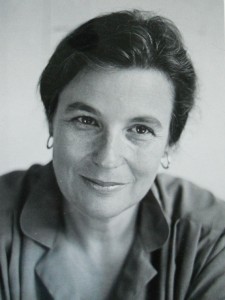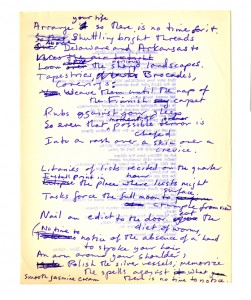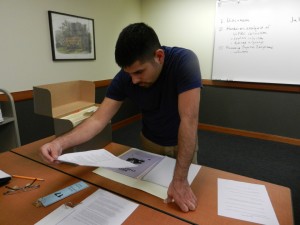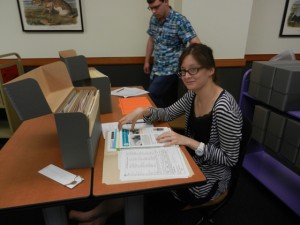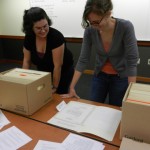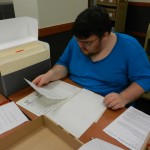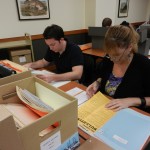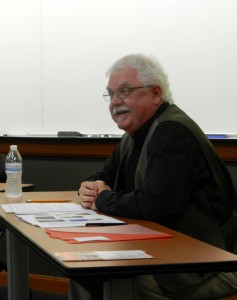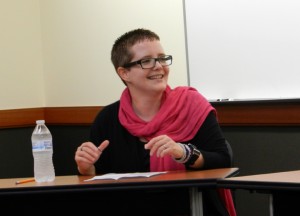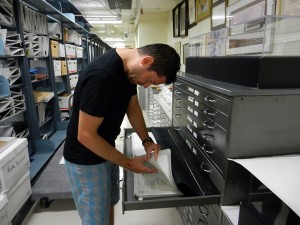
Cynthia Macdonald, acclaimed poet and co-founder of the Creative Writing Program at the University of Houston, died last month at the age of 87.
Macdonald began her career intending to be an opera singer, then switched to writing poetry. She published seven books of poetry, including Amputations (1972), Transplants (1976), W(holes) (1980), and I Can’t Remember (1997). Her work revealed an interest in the artistic, the freakish, and the domestic, a preference for pithy language, a dark wit, and delight in playing with form. She was honored with a 1983 Guggenheim Fellowship among other writing awards.
Macdonald came to the University of Houston after previously teaching at Sarah Lawrence College and Johns Hopkins University. In 1979, she founded the renowned Creative Writing Program along with fellow poet Stanley Plumly. Macdonald was considered an extremely knowledgeable and supportive instructor and mentor. In 1989 she received the Esther Farfel Award, the University of Houston’s highest faculty award.
In addition to writing and teaching, Macdonald was a practicing psychotherapist who specialized in helping people with writer’s block.
Also a mother, she leaves behind two children, Jennifer Macdonald and Scott Macdonald.
In 2010, the University of Houston Libraries acquired the Cynthia Macdonald Papers, a sprawling collection of manuscripts, correspondence, and materials from the writer’s teaching and psychoanalytical careers. Special Collections also holds the Library of Cynthia Macdonald, a collection of over 3000 books, primarily contemporary American poetry, many of which were inscribed to Macdonald by her literary friends.
See also, “The Writer’s Life.”
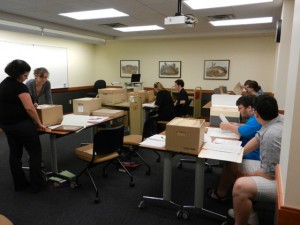
Students in the Archival Practice and Organizational Histories course meeting in the Evans Room of Special Collections.
The UH Public History Program prepares graduate students interested in history for positions in various historical venues, government agencies, business enterprises, and educational institutions. This fall, students enrolled in Dr. Kairn Klieman’s course “Archival Practice and Organizational Histories” spent three weeks immersed in the theory behind archives and the work of professional archivists. Coordinator for Instruction Julie Grob welcomed the students to Special Collections, where they focused their learning on the fascinating collections that make make up the Carey C. Shuart Women’s Archive & Research Collection (WARC). The goal of the unit was to encourage students to consider archives as a potential career, introduce them to the riches of WARC, and lead them to understand how archivists and institutions make collecting decisions which may perpetuate the dominant narrative or fill in gaps in the historical record.
Students in the course read a variety of journal articles about archival theory and practice, attended lectures and discussions led by Grob, toured Special Collections, and completed a project in which they arranged a photocopied version of an archival collection in order to duplicate the work on an archivist. Their favorite activity was probably exploring some of the WARC archival collections related to local organizations such as the Hispanic Women in Leadership Records, Women in Action Records, and Women in the Visual and Literary Arts Records. One pair of students was excited to find correspondence between the Houston Council of Texas Garden Clubs and (then Senator) Lyndon B. Johnson, related to an environmental cause. Students also enjoyed a visit from Vince Lee, curator for WARC, who spoke to the class about his background and career path to the field of archives, and his work with donors and incoming collections.
Following the archives unit, the students went on to work extensively with the local nonprofit Voices Breaking Boundaries, recording oral histories and writing an organizational history to document the organization. The records of Voices Breaking Boundaries, and the oral histories created by Dr. Kairn’s students, will be added to WARC.
If you are interested in exploring the collections yourself, you may visit the WARC website to view finding aids (guides to the collections) and digital collections, or stop by Special Collections during our open hours. If you are a faculty member interested in having a unit developed around archival practice or our primary source collections, please e-mail Julie Grob.
“Archival Practice and Organizational Histories” Course Visits Special Collections
- This pair of students found an unexpected treasure in the Houston Council of Texas Garden Clubs, Inc., Records, which led them on a quick research quest.
- Student filling out analysis worksheet related to a collection in the Carey C. Shuart Women’s Archive and Research Collection.
- Students looking through a box of documents from the River Oaks Business Women’s Exchange Club Records.
On Tuesday, September 16th, Special Collections welcomed Edward Lukasek and Dr. Natalie Houston for a panel discussion titled “Life with Books: Collecting, Reading, and Teaching LGBTQI Literature.” Cosponsored by the UH Libraries and the LGBT Resource Center, the event was intended to complement the exhibit LGBTQI Literature: Celebrated Classics and Contemporary Works, which closes on Friday, September 26th.
A rapt audience of faculty, librarians, staff, and visitors enjoyed learning about the role that books played in the lives of the two panelists – Edward Lukasek, a book collector whose private collection was donated to the UH Libraries as the Edward Lukasek Gay Studies Collection, and Natalie Houston, an Associate Professor in the English Department at UH who has taught a number of courses on LGBT literature.
Lukasek described collecting books at his favorite thrift shop while living in the Castro district of San Francisco for 17 years. Asked to recommend his favorite work of LGBTQI literature, he chose the trilogy of autobiographical novels by Edmund White: A Boy’s Own Story, The Beautiful Room is Empty, and The Farewell Symphony. He praised White’s ability to put the reader in the moment, and said that he appreciated reading about the experiences of a gay man from an earlier generation. Lukasek also described the flowering of literature that followed the early years of the AIDS epidemic, recommending Heaven’s Coast by Mark Doty as a particularly poignant memoir.
Houston has always been a voracious reader. While her major field of interest is Victorian literature, she enjoyed studying with queer studies pioneer Eve Sedgwick as a PhD student at Duke. Arguing that it was unfair to ask an English professor to pick only one favorite LGBTQI book, Houston recommended three favorite authors and works – Michael Cunningham’s A Home at the End of the World, a beautifully written novel about friendship; Carol Anshaw’s Aquamarine, the story of a woman’s three possible lives; and Emma Donoghue’s Hood, which centers on the death of the protagonist’s lover. Houston also talked about her rewarding experiences teaching LGBT literature to UH students.
The panel discussion made for a very special conversation; please enjoy a video from the event below.
Many of the books featured in our current exhibition LGBTQI Literature: Celebrated Classics and Contemporary Works have been adapted into acclaimed movies and TV miniseries. From eighties costume drama Brideshead Revisited to this spring’s HBO film The Normal Heart, the stories of people who identify as LGBTQI have made for compelling drama on the big and small screen.
With the dog days of summer upon us, we recommend that you come view the exhibition, stop off for lunch or dinner at Eric’s Restaurant on campus, and then unwind at home with one of the following:
Those who are suffering from Downton Abbey withdrawal might enjoy the British miniseries Brideshead Revisited (1981), the tale of a friendship that develops between two young men at Oxford in the decade following WWI. Based on the novel by Evelyn Waugh, Brideshead… made a star of Jeremy Irons.
Desert Hearts (1985), directed by Donna Deitch and based on the novel Desert of the Heart by Jane Rule, is considered a classic of lesbian film. It centers on the realistic romance between divorcing housewife Vivian and casino worker Cay in Reno, Nevada.
Steven Spielberg directed The Color Purple (1985), an adaptation of the Pulitzer Prize-winning novel by Alice Walker. In it, main character Celie (played by Whoopi Goldberg) finds her life changed by an affair with the beautiful blues singer Shug.
Armistead Maupin’s Tales of the City (1993) was the first of three miniseries based on the writer’s popular books about life in a San Francisco apartment building in the 1970s. It starred a less well-known Laura Linney as the naive new tenant Mary Ann, and Olympia Dukakis as landlady Mrs. Madrigal. Various straight and gay neighbors with their own stories rounded out the characters.
The script for the two-part HBO production of Angels in America (2003) was adapted by Tony Kushner from his play about the AIDS epidemic in Reagan’s America. Angels… won 11 Emmy Awards including acting nods for Al Pacino as closeted conservative attorney Roy Cohn, and Jeffrey Wright as the compassionate nurse Belize.
Brokeback Mountain (2005) started out as a story by Annie Proulx in her 1999 collection Close Range: Wyoming Stories. The tale of two ranch hands who fall in love was adapted into a full-length screenplay by Larry McMurtry and his writing partner Diana Ossana. The Ang Lee-directed film starred Jake Gyllenhaal and the late Heath Ledger as the star-crossed Western lovers.
In May 2014, miniseries The Normal Heart debuted on HBO. Based on Larry Kramer’s 1985 play about activism during the early years of the AIDS crisis, it starred Mark Ruffalo and Julia Roberts, and will be released on DVD later this month.
LGBTQI Literature: Celebrated Classics and Contemporary Works will be on view on the 1st floor of MD Anderson Library through Sept. 26, 2014.
Today we have a goodbye post from Bryan Bishop ’14, the department’s first Instruction Support Student Worker. During his year in the position, he prepared rare materials for class visits, maintained the Evans Room (our classroom and function space), input student learning assessment data, digitized materials requested by patrons, and created descriptive metadata for a collection of World War II photographs.
A graduate of the UH Honors College in History and Political Science, Bryan is heading to Fonville Middle School in H.I.S.D. to teach U.S. History for the 2014-15 school year. He has also been accepted into the John W. Draper Master’s Program in Humanities and Social Thought at NYU with a deferred start date. All of us will miss Bryan’s intellectual curiousity, “can do” attitude, and sense of humor. Heeeeeere’s Bryan!
When I happened upon the Instruction Support position available in Special Collections last August, I had no idea what “instruction support” was, or that it would be the best job I ever had. As an older student worker I had had a few jobs prior to arriving at UH. But those jobs levied tremendous pressure, rarely yielding pleasure. This job was different. All that would be asked of me was to show up ready to work, complete thoroughly what was asked of me, and display passion for my projects, most of which involved research relating to my studies and interests: humanities and social sciences. Strange as it may sound, in 20 years of working this was the first time I was unconditionally happy.
Performing tasks around the department was a riot. True, I too have never associated riots with libraries. If anything, life surrounding a library is the complete opposite, serene. So how was working in Special Collections a riot? It was a riot in the sense of how I felt while and after performing my duties; that everything I did was significant for our university community and a team I hold in the highest regard—my co-workers, my friends. This, admittedly, is a peculiar illustration; however, I find that the more idiosyncratic a description is, the more unique, and in this case, special, the experience was.
I could utilize more space than the Interwebs have allotted to express my gratitude vis-à-vis the projects on which I was allowed to work. Ergo, I must devote my closing thoughts to my peers and managers in the department.
Okay, done.
